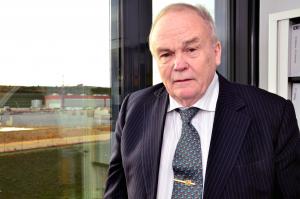ITER godfather turns 80
6 Feb 2015
-
Alexander Petrov, ITER Russia
On 2 February in Moscow, academician Evgeny Velikhov—distinguished scientist, president of the Kurchatov Institute, and initiator and key player of the ITER Project—turned 80. At a celebration on 4 February, ITER Russia staff and the heads of leading institutes and industries involved in project implementation cordially congratulated Mr Velikhov, as messages poured in from home and abroad to wish him professional and private success, good health and longevity.
In 1973, academician Evgeny Velikhov accepted the torch from Lev Artsimovich to take the lead in the Soviet Union's fusion program. He helped to initiate the ITER Project at the highest political level.
Evgeny Velikhov was born on 2 February 1935 in Moscow.
His life journey has been an example of rare professional focus and devotion. After graduating from Moscow State University, he began his career as junior researcher at the Kurchatov Institute of Atomic Energy. He was appointed head of laboratory in 1962 and head of department in 1970. From 1971-1978 Evgeny Velikhov directed a branch of the Kurchatov Institute in Troitsk (now TRINITI). In 1988 he became the director of the Kurchatov Institute and, four years later, its president.
It would be difficult to overstate academician Velikhov's contribution to the world of science, especially plasma physics and fusion. In 1973, he accepted the torch from Lev Artsimovich to take the lead in the Soviet Union's controlled thermonuclear fusion program. He helped to initiate the ITER Project at the highest political level by persuading Secretary-General Mikhail Gorbachev that the next generation fusion device needed to be a joint international effort. He was ITER Council Chair during the technical design phase for ITER and again at the start of ITER construction from 2010-2012.
Evgeny Velikhov has received numerous national and international distinctions, including the Order of Merit for the Fatherland and the Order of Courage. He is a member of the Russian Academy of Sciences and holds honorary positions at a number of Russian and international universities.


